By Jessica Thorn. From 23-27th April, 2017, Mountain Sentinels hosted our third international workshop near the lovely Bend, Oregon, surrounded by the beautiful Mount Washington, Tumalo State Park, Three Sisters mountains, Santiam Pass and Metolius Spring. The meeting brought together 22 researchers representing 19 research, university, state, and educational institutions. We exchanged a wealth of knowledge, building on the experience of people working in 13 countries and 18 study sites, including the mountains of Morocco, Bolivia, Peru, Honduras, Tanzania, Switzerland, Nepal, Tibet, Kenya, Ethiopia, Slovenia, Thailand, and the US. The aim was to work towards a synthesis of participatory SES modeling across mountain systems, asking how to co-create a vision for sustainable mountains, identify adaptive transformations, and support local action.
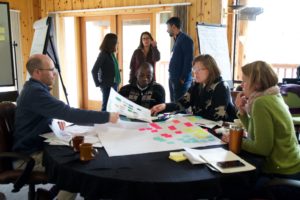
The agropastoral land use group.
We began by exchanging approaches to participatory SES modeling, case studies, and lessons learned from using methods such as agent-based models, scenario planning and analysis, and Bayesian networks. Topics ranged from global food security impacts on smallholder farmers in Morocco, Ethiopia, and Kenya; anticipating water scarcity and informing integrative water management responses in the Pacific Northwest, US; glacier loss and hydro-social risks in the Peruvian Andes; and forest fire restoration in the Deschutes river basin of Oregon US and southern Switzerland.
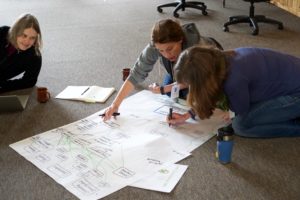
Robin, Kelly and Karina work on the pastoral conceptual model.
On the first day, we discussed cognitive and Bayesian network modeling across mountains land use systems, and addressed the benefits and pitfalls that arise when dealing with issues of probability, uncertainty, and causality. We discussed the important but challenging roles of sensitivity analysis, calibration, verification, validation, and backcasting. We then divided into small groups and used site-based directed acyclic graphs to develop composite cognitive models that reflect prominent issues, variables and their relationships in each land use group. Researchers deliberated to identity common questions and hypotheses to test within and across mountain land use groups.
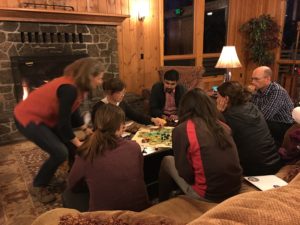
Birgit leads a game of Nomadset.
Another key challenge raised in the workshop was identifying and understanding possible desirable and undesirable future scenarios in mountain systems. The session on scenario analysis was an opportunity to discuss scenario setting, development of storylines at subnational scales, and translation into semi-quantitative and spatially explicit information. Four working groups then developed multi-dimensional scenarios, focusing on diverse social and biophysical drivers of change. For example, one group developed scenarios along gradients of the level of income equality and market vs. subsistence based economies, resulting in a discussion of the conditions under which inclusive policy-making and shared use of resources might arise.
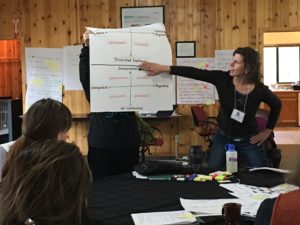
Stephanie presents her group’s scenario axes.
Drawing from the experience of participants from the Oregon Department of Education and Portland Public Schools, we focused on how to make information from our network more accessible and engaging to students across different grade levels with a focus on middle and high school students. We discussed the need to build curricula that foster the learning of science and mountain issues and proposed developing learning and assessment tools, including the use of StoryMaps (via ESRI’s ArcGIS online platform), a role-playing scenario game, and a social networking element which would connect students in mountain areas around the world.
We discussed the challenge of how to successfully engage stakeholders with complex SES modeling efforts. Colleagues from the Himalayas and from the Oregon Cascades in the US shared their stories in this regard. We also obtained input on this issue from each site represented at the network through a quick, written survey. Our discussion on this topic emphasized the importance of boundary spanning individuals and organizations to forge connections between science, policy, and practice. We noted that limited evidence is available with regards to outcomes of transdisciplinary research, and that funding and time restrictions often lead to a lack of monitoring and evaluation.
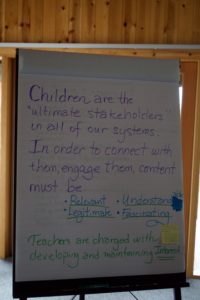
An important message from our educators, Thea and Jamie.
After four productive days and learning, we developed work plans and timelines. We have two groups working on a total of three mountain synthesis modeling-related efforts and another group focused on the educational objectives.
Thank you to Anne Nolin for being an amazing workshop host!!!!
On another note, we invite all who are interested to join our monthly Virtual Coffees, beginning on October 26, 2017 with a discussion of the Multi-platform International Summer School on Agent-based Modeling, which two PhD students in our Early Career Network recently attended. Hope to talk to you then!!

